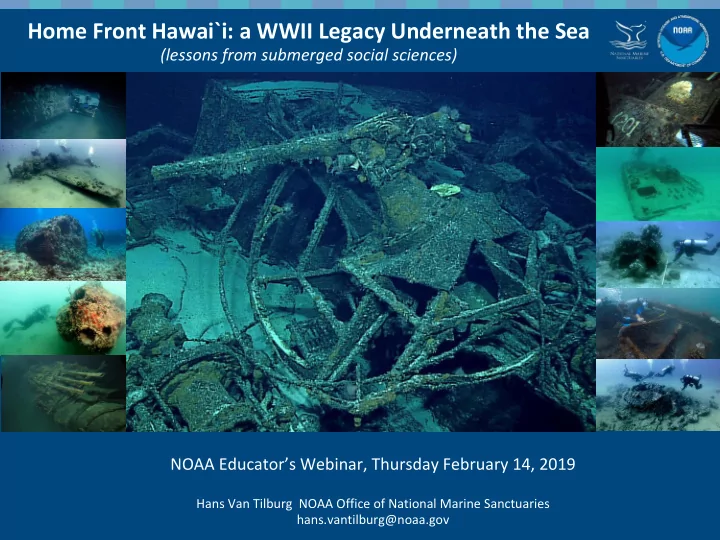

Home Front Hawai`i: a WWII Legacy Underneath the Sea (lessons from submerged social sciences) NOAA Educator’s Webinar, Thursday February 14, 2019 Hans Van Tilburg NOAA Office of National Marine Sanctuaries hans.vantilburg@noaa.gov
Topics to be Covered: 1) The maritime heritage field = submerged social science 2) The Hawaiian Islands during the war years = history 3) The WWII resource base in Hawai`i = maritime archaeology 4) Wrecks and the environment = biological interactions 5) Access to the oceans = evolving marine technology 6) Maritime Cultural Landscapes = understanding our impacts
Submerged Social Sciences What is Maritime Archaeology? “The interpretation of the seafaring past through the study of things manufactured or modified by humans … usually underwater” Field initiated by Dr. George Bass and others in the 1960s This … Multidisciplinary: Anthropology but not this … History Geography Engineering Chemistry etc This …
Training in the maritime archaeology field College graduate (Masters) degree standard for the field • Applied skills needed: Types of coursework: • diving • archaeology • computer • anthropology • grant writing • history • rigging • museum studies • drafting (drawing) • material culture • photography • GIS and mapping • archival research • engineering • acoustics • etc Main American universities: • Texas A&M • East Carolina University
Maritime Heritage: the Preservation of our archaeological resources in the sea • National Historic Preservation Act section 106 section 110 • National Marine Sanctuaries Act includes historic, archaeological, cultural resources • Abandoned Shipwreck Act State properties under DLNR • Sunken Military Craft Act military vessels remain federal property
History: Islands during War Years Waikiki, Territory of Hawai`i, 1943 • Martial Law • Japanese internment • Loss of habeas corpus • School closures • Censorship • Coastal fortifications • Gas masks • Curfew • Blackout • Rationing • Victory gardens • Loss of fishing fleet US Army Museum
History: Islands during War Years Japanese-American loyalty on parade, Waikiki 1942 US Army Museum
History: Islands during War Years 4 th Marine Division departing Kahului, Maui National Archives
History: Islands during War Years WWII Ground training areas, Territory of Hawai`i US Army Museum
Archaeology: Early Naval Aviation in Hawai`i (NOAA ONMS) USN Keystone PK-I naval flying boat, long-range patrol bomber 1930s (USN photo) Ford Island VP-1 squadron insignia (NOAA ONMS)
Archaeological Resource: 1,475+ Sunken Naval Aircraft SB2C-1C Helldiver TBF Avenger (Ross and Milisen 2015) F6F Hellcat (HURL)
Evolution of amphibian vessels and tactics, 1932-1945 (USN image) LCA landing craft assault, small vessel LCI landing craft Infantry, fitted with bow doors LCP landing craft personnel, for transporting personal And specific LCS landing craft support, small armed landing craft LCT landing craft tank, up to four tanks and bow doors variations of all LSI landing ship infantry, ship carrying LCI, or capable of being grounded these: LSM landing ship medium LST landing ship tank, RoRo vessel converted for carrying tanks DUKW amphibious truck six-wheel drive
Archaeological Resource: Amphibious Vessel losses in Hawai`i Operation Forager training exercises April-May 1944, Maui (NARA) LVT-4 Maui LVT(A)-4 Maui
USS Utah Combat losses in Hawai`i Islands only attacked a couple times PBY-5 site plan (Kaneohe Bay) USS Arizona (NPS) Japanese Kohyoteki (minisub) HURL (NPS)
Main Hawaiian Islands 2,127 entries in the database
Educational Collaboration: MAST courses (UH) NAS sport diver training
Biological Interaction: Wrecks in the Marine Environment
Biological Interaction: Wrecks in the Marine Environment
Biology: Wrecks in the Marine Environment
Technology: Multibeam and Backscatter Data for Target Analysis (NOAA OER) Hull-mounted Kongsberg EM302 30khz multibeam multibeam sonar Range 7000m Multibeam survey The multibeam target = Japanese sibmarine I-401 Backscatter imagery comparison
Technology: from Breath-hold to Bubbles and Beyond Diving bell 17 th century Open-circuit scientific diving SCUBA 1950s Lloyd bridges as Mike Nelson! Closed-circuit rebreather technology Heavy gear 19 th century
Hawai`i Undersea Research Lab PISCES 3-person research submersibles (HURL C Wollerman)
Ship control cab ROV Surveys ( Okeanos Explorer ) Remotely Operated Vehicles Deep Discoverer and Seirios Range 6000m Shoreside Comm Center
Deploying Seirios and D2 ROV system
1) Oahu S-19 survey Sept 2015 2) Wake Island Amakasu Maru No.1 survey March 2016 3) Tinian B-29 Superfortress survey July 2016 NOAA CAPSTONE 4) Oahu Japanese mini-submarine survey Dec 2016 archaeology missions 5) Oahu Royal Taipan (ex-USS Swan ) survey Dec 2016 2014-2017 6) Oahu Sentaka I-203 search Sept 2017 7) Oahu USS Baltimore survey Sept 2017
Cultural Landscapes: Patterns in Ocean History Navigation landscape along coasts and harbors Cultural landscape of traditional voyaging Commercial fishing landscape "The maritime cultural landscape signifies human utilization (economy) of maritime space by boat, settlement, fishing, hunting, shipping, and its attendant subcultures, such as pilotage, lighthouse and seamark maintenance … "
Using a landscape analysis to understand WWII on the home front
Amphibious landing plan “Porcelain” Island -- Kwajalein National Archives …one of the most organized, premeditated, regimented, and patterned forms of human behavior…the action of military units on a battlefield are based on the tactics of the prevailing military wisdom of the day; they are not random. (Potter et al 2000)
helldiver sailboat schooner helldiver helldiver hellcat mooring GREEN 1 T.A. 2 nd Div LST area GREEN 2 BLUE 1 St Anthonys LVT LST BLUE 2 area T.A. 4 th Div MAKENA AIRFIELD (CONSTRUCTIVE) LVTs schooner Amphibious rehearsal exercises LVT Maui Island, Operation Forager, May 1944
Examples of modern military training landscapes in Hawai`i
Potentially polluting wrecks worldwide
Review: 1) The maritime heritage field = submerged social science 2) The Hawaiian Islands during the war years = history 3) The WWII resource base in Hawai`i = maritime archaeology 4) Wrecks and the environment = biological interactions 5) Access to the oceans = evolving marine technology 6) Maritime Cultural Landscapes = understanding our impacts
“Curiosity is the First Prerequisite” Wreck of the Dunnottar Castle 1886 History and heritage have a special place in Our Oceans… Thank you for participating
Recommend
More recommend